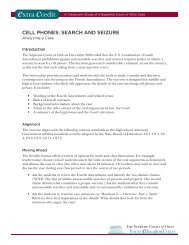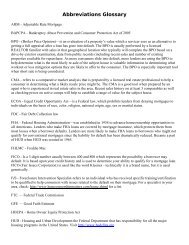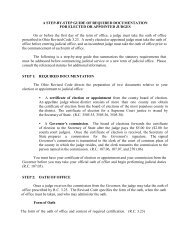Planning for Parenting Time: Ohio's Guide for Parents Living Apart
Planning for Parenting Time: Ohio's Guide for Parents Living Apart
Planning for Parenting Time: Ohio's Guide for Parents Living Apart
Create successful ePaper yourself
Turn your PDF publications into a flip-book with our unique Google optimized e-Paper software.
Special Issues<br />
MILITARY<br />
The reality <strong>for</strong> military families is movement. When parents are first divorced or separated,<br />
they may live in the same community. This will require a parenting schedule that focuses on<br />
sharing the child when the parents live close to each other and allowing <strong>for</strong> temporary duty<br />
assignment (TDY) possibilities. Military families should think about including a longdistance<br />
parenting schedule in case parents are no longer living in the same area. Detailed<br />
travel arrangements are an important part, as well as allowing <strong>for</strong> deployment and TDY<br />
issues.<br />
<strong>Parents</strong> may consider how parenting time can be rearranged because of temporary duty<br />
assignments or overseas commitments. One idea is to extend summer or winter breaks to<br />
allow <strong>for</strong> such situations.<br />
Maintaining contact between the child and the non-residential military parent is important.<br />
The residential parent can support the child’s relationship with the other parent by having a<br />
consistent plan of communication with the other parent. It may seem at times (to the<br />
residential parent) that he or she is shouldering most of the responsibility <strong>for</strong> fostering the<br />
child’s relationship with the absent parent. It is important to know that the child will benefit<br />
from this ef<strong>for</strong>t as the child gets older.<br />
NEVER MARRIED<br />
When parents are not married to each other when their child is born, the biological father has<br />
no legal right to custody or parenting time until paternity is legally established and the court<br />
orders custody and parenting time. The court also will not order child support until paternity<br />
is legally established.<br />
When a parent has not had parenting time with the child be<strong>for</strong>e, the court may order limited<br />
parenting time at first and gradually increase it over time. The court may order supervised<br />
parenting time at first until the parent has gained parenting skills and the child feels<br />
com<strong>for</strong>table with the parent.<br />
Unmarried parents may not know each other very well and, as a result, cannot rely on<br />
previous experiences of working together as parents. If the parents never lived together or did<br />
so only <strong>for</strong> a short time, they need to develop a cooperative parenting relationship. The<br />
parents may find joint counseling helpful.<br />
The extended family members should be supportive of each parent’s relationship with the<br />
child. It is important <strong>for</strong> each parent to be responsible <strong>for</strong> his or her relatives and to ask them<br />
to support the child’s relationship with the other parent.<br />
69
















